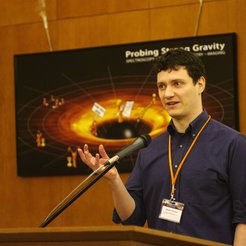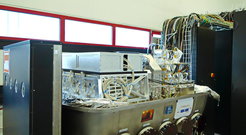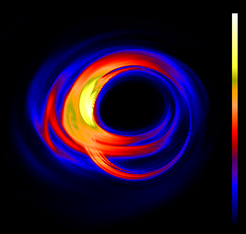Interview with Jason Dexter
Sofja Kovalevskaja awardee at MPE
Why do Black Holes interest you?

Jason Dexter, giving at talk about black holes
The theory of general relativity has been around for 100 years, and it does an excellent job of explaining gravity in systems where it is “weak” - that is in circumstances, where general relativity is a small correction to Newton’s theory of gravity. All tests that are done in the solar system fall in this category.
More fascinating for me, however, is one of the most exotic predictions of general relativity: the existence of black holes, objects that have collapsed to the point where their mass is hidden behind an event horizon. Nothing can escape from there! Some of the strongest gravitational fields are near the event horizons of black holes, and so studying these objects provides an opportunity to test general relativity in a completely new way.
As for my work: I’m a studying the physics of gas falling into black holes. A major part of my research involves calculating the properties of the light that this gas radiates on the way in, and comparing those predictions to observations by ground- and space-based telescopes.
You’ve been here for a few months now. How do you like it?
It's great so far. I like the science environment at MPE and the Garching campus as a whole. I’m particularly impressed with the MPE facilities (especially the machine and electronics workshops), and the institute’s track record of building instruments and then using them to do science.
Munich is nice, even though this winter has been cold and dark after spending a few years in California. But I like the snow, and being close to the mountains. It’s also nice that people spend so much time outside in winter, even in the city. Still, I’m looking forward to summer.
Were there surprises when you came here?

Most things have been basically as I imagined or hoped. Of course there’s work involved when moving to a new country, but I actually didn’t expect things to go this smoothly at the start. So I’d like take this opportunity to thank all members of the administration and the MPE infrared group for helping with the transition.
Since I’m a theorist, being in a group of observers has been interesting. So far, I have usually worked with one or two other people, whereas large observational projects or especially instrument projects involve much larger teams. I’ve also found the breadth of expertise of many people here a little intimidating. Working in the lab, building new instruments, and then using them to do science is very impressive.
In day to day life, I’m becoming more aware of some of my American habits like talking over people, exaggerating, and feeling the need to speak to fill in silences in conversation. So I’m trying to do those things less. On the other hand, I’m working on improving my German. I studied German in school for several years, but hadn’t used it much before arriving in Munich. I’m grateful that people here have been so patient with me, and continue speaking to me in German even when I struggle.
What are your plans for the future?

Predicted image of how the light from gas near the black hole at the Galactic centre might be seen by the proposed Event Horizon telescope.
I am starting a small theory team within the infrared group, and so mostly have been busy with recruiting. I’m happy to say that we have a PhD student starting this summer, and hopefully there will be a couple more people hired over the next year or so.
Research-wise, this is a really exciting time for my main science interests. The Event Horizon Telescope and GRAVITY experiments will be zooming way in on the black hole in the centre of the Milky Way to look at gas near the event horizon. The goal for the next few years is trying to understand what the data mean and how they can be used to say something about general relativity. Members of the MPE IR group are leading the GRAVITY experiment, which was one of my main motivations for coming to MPE.
And long-term?
I want to continue doing astrophysics, and I like working on research problems at the boundary between theory and observation. Astrophysics is a field driven by new data, so it’s important for theorists to be flexible in their long term research plans. It’s also exciting, because theorists can make predictions which will be tested within several years. I will continue to seek out opportunities to do just that.













